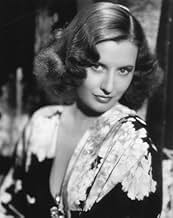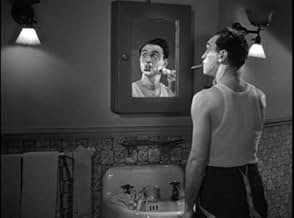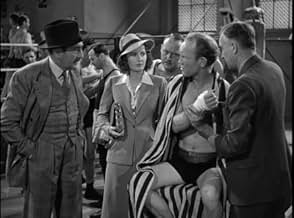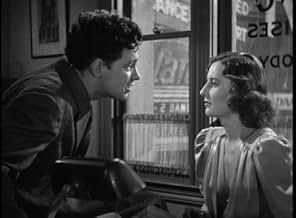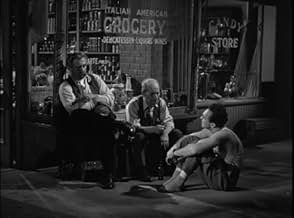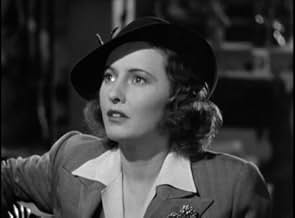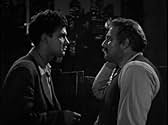NOTE IMDb
6,8/10
2,3 k
MA NOTE
Un jeune homme à la vocation de violoniste se met à la boxe pour gagner de l'argent et commence à s'éloigner de son véritable rêve. Son père lui rappelle que sa passion est la musique, mais ... Tout lireUn jeune homme à la vocation de violoniste se met à la boxe pour gagner de l'argent et commence à s'éloigner de son véritable rêve. Son père lui rappelle que sa passion est la musique, mais il ne trouve pas si facile de prendre cette voie.Un jeune homme à la vocation de violoniste se met à la boxe pour gagner de l'argent et commence à s'éloigner de son véritable rêve. Son père lui rappelle que sa passion est la musique, mais il ne trouve pas si facile de prendre cette voie.
- Réalisation
- Scénario
- Casting principal
- Nommé pour 1 Oscar
- 1 victoire et 1 nomination au total
Edward Brophy
- Roxy Lewis
- (as Edward S. Brophy)
Charles Halton
- Newspaperman
- (scènes coupées)
Stanley Andrews
- Driscoll - Fight Official
- (non crédité)
Gordon Armitage
- Fighter
- (non crédité)
Earl Askam
- Policeman
- (non crédité)
Don Brodie
- Reporter
- (non crédité)
Mushy Callahan
- Fight fan
- (non crédité)
Dora Clement
- Ill Ringsider Who Won't Leave
- (non crédité)
Avis à la une
Notable for being William Holden's debut (he was just 21 and looks almost like a schoolboy!), this dated melodrama was adapted from a popular play by Clifford Odets dealing with a young man conflicted about which path to take in his life: a respected artistic career playing the violin and the more alluring celebrity (which also reaps instant monetary rewards) as a prizefighter. His Italian immigrant father (Lee J. Cobb, whose mannered performance has been especially criticized) obviously wants the boy to follow his musical instincts, but the pull of the ring is too great more so because through it he meets and falls for Barbara Stanwyck, actually his manager (Adolphe Menjou)'s fiancée. Though initially acting under the latter's instructions, she eventually tries to dissuade him from fighting, particularly when gangster Joseph Calleia (another fine showcase for the Maltese character actor) takes Holden under his wing. The climax sees the hero winning the championship bout but at the cost of his black opponent's life and his own left hand; with the help of Stanwyck (realizing she really loves the boxer, Menjou relinquishes her) the "Golden Boy" stands up to his new boss interestingly, Calleia lets him off rather too easily here when compared to similar films of later vintage! The film is pretty good (with equally solid support from Sam Levene as Holden's struggling cab driver brother-in-law) though betraying its stage origins by relegating the boxing matches to only a brief montage until the not very imaginatively handled finale; in hindsight, it's curious to find this cinematically lacking given the involvement of Mamoulian and his reputation as one of the most creative directors of the early Talkie era!
A great film. A (very) young William Holden "hits" the bulls-eye on this one. And, I always love to see Barbara Stanwyck's hard, street smart "heart of stone" turn to mush. In a story that won't present you with many surprises as it unfolds, this film is held together by many fine performances. It's from that magical time, long ago, when New York City was inhabited by hustlers and gangsters and boxing was king. It was also inhabited by those of strong family values, the ones fighting that constant battle of the "easy" way or the right way. The mainstay, in that era (in film, anyway), was the ultimate triumph of good. Here, it is a joy to behold. The right choices, by both Stanwyck and Holden, seem very apparent to the viewer, but the right choices are rarely the first ones taken.
Eventually, they can be taken......
Eventually, they can be taken......
This is a wonderful, compelling, emotionally charged movie, with characters that are both interesting and likable. Of course, the central character of the movie is Joe Bonaparte, played by a young, gifted actor named William Holden. Joe's conflict, between his quest for fame as a prize fighter and his father's wish to become a concert violinist, although seemingly corny and contrived, actually works in this movie. And this can be attributed to the fine acting of all the players - Barbara Stanwyck, Lee J. Cobb, Adolph Menjou, and William Holden - who prove that high quality acting can transform a good script into a great script. One particularly intense scene is when Joe tries to play the violin - and he can't, leaving him devastated in the knowledge that he had squandered a gift and in the process had disappointed his father. This is a movie that is worth the time to watch and to enjoy.
The acclaimed play by Clifford Odets, Golden Boy, ran for 250 performances during the 1937-1938 season on Broadway and as Columbia had now pulled itself into the big leagues of studios in Hollywood, Harry Cohn was able to bid for this much heralded property right up there with Mayer, Zanuck, and Zukor.
The problem was that the one guy who could have played it best, John Garfield, was over at another studio. Garfield was in the original cast on Broadway, but in the role of the brother-in-law Siggie that Sam Levene plays here. Eventually however Garfield did play the title role in a revival on Broadway in 1952, it was the last thing he did.
When I lived in New York, I saw a revival of Clifford Odets's Awake and Sing on stage and the left wing nostrums of the day were dated in the Reagan years of the Eighties. Golden Boy is similarly dated. Yet the performances in the film still hold up to some degree.
When Harry Cohn couldn't get Tyrone Power loaned out from 20th Century Fox, he decided to go for an unknown. Director Rouben Mamoulian while testing actresses for the sister part that eventually went to Bernice Blinn, he spotted a young actor who had just done two tiny bit parts in Paramount features feeding lines to the actress whose test it was. Mamoulian persuaded Cohn to call off the search and William Holden's career was launched.
It's legendary now how Barbara Stanwyck worked and rehearsed with Holden endlessly to make sure he scored a success in his feature film debut. Holden paid a heartfelt tribute to her at an Oscar ceremony and when she got her Lifetime Achievement Oscar she dedicated it to him.
It's legendarily unselfish of Stanwyck to do what she did in a town and industry where egos are gargantuan. Unselfish, but also practical. She knew that if he flopped in the lead the film would have gone down the toilet and it wouldn't do her career any good.
The only player from the original cast on Broadway to come to Hollywood was Lee J. Cobb. And not in the part he played on Broadway, on Broadway he was the neighbor Mr. Carp, in the film he's made up to be older as Cobb often was as Bill Holden's father. This set a pattern in his career.
Two other performances of note are Adolphe Menjou as Holden's manager and Joseph Calleia as the gangster Fusselli who buys into Holden's contract.
This story of a Depression kid who had a choice between a career in the ring and a career playing the violin had to be heavily rewritten for the screen. The adulterous relationship between the married Menjou whose wife we never see and Stanwyck was barely mentioned. And Stanwyck's own character was cleaned up quite a bit, in the original play she's more of a tramp than here.
My guess is that Golden Boy would have to be heavily rewritten if it were updated for today. The critical success, but financial failure of Ron Howard's Cinderella Man which was a true story of a heavyweight champion in the Depression found no audience today.
Though it's dated badly, the sincerity of the performances do come through and it's easy to see why William Holden became the star he was.
The problem was that the one guy who could have played it best, John Garfield, was over at another studio. Garfield was in the original cast on Broadway, but in the role of the brother-in-law Siggie that Sam Levene plays here. Eventually however Garfield did play the title role in a revival on Broadway in 1952, it was the last thing he did.
When I lived in New York, I saw a revival of Clifford Odets's Awake and Sing on stage and the left wing nostrums of the day were dated in the Reagan years of the Eighties. Golden Boy is similarly dated. Yet the performances in the film still hold up to some degree.
When Harry Cohn couldn't get Tyrone Power loaned out from 20th Century Fox, he decided to go for an unknown. Director Rouben Mamoulian while testing actresses for the sister part that eventually went to Bernice Blinn, he spotted a young actor who had just done two tiny bit parts in Paramount features feeding lines to the actress whose test it was. Mamoulian persuaded Cohn to call off the search and William Holden's career was launched.
It's legendary now how Barbara Stanwyck worked and rehearsed with Holden endlessly to make sure he scored a success in his feature film debut. Holden paid a heartfelt tribute to her at an Oscar ceremony and when she got her Lifetime Achievement Oscar she dedicated it to him.
It's legendarily unselfish of Stanwyck to do what she did in a town and industry where egos are gargantuan. Unselfish, but also practical. She knew that if he flopped in the lead the film would have gone down the toilet and it wouldn't do her career any good.
The only player from the original cast on Broadway to come to Hollywood was Lee J. Cobb. And not in the part he played on Broadway, on Broadway he was the neighbor Mr. Carp, in the film he's made up to be older as Cobb often was as Bill Holden's father. This set a pattern in his career.
Two other performances of note are Adolphe Menjou as Holden's manager and Joseph Calleia as the gangster Fusselli who buys into Holden's contract.
This story of a Depression kid who had a choice between a career in the ring and a career playing the violin had to be heavily rewritten for the screen. The adulterous relationship between the married Menjou whose wife we never see and Stanwyck was barely mentioned. And Stanwyck's own character was cleaned up quite a bit, in the original play she's more of a tramp than here.
My guess is that Golden Boy would have to be heavily rewritten if it were updated for today. The critical success, but financial failure of Ron Howard's Cinderella Man which was a true story of a heavyweight champion in the Depression found no audience today.
Though it's dated badly, the sincerity of the performances do come through and it's easy to see why William Holden became the star he was.
While 1939 has been properly established as a year of many exceptional films of the American cinema, my favorite actor, Miss Barbara Stanwyck, starred in two: The DeMille epic UNION PACIFIC, and this Clifford Odets' play-turned-movie, GOLDEN BOY. While this film is usually recognized as the one that made William Holden a star, equally famous is the story of how he would have been fired from the film during production had it not been for veteran Stanwyck sticking up for him, insisting that they give him a chance, and then helping him to be a success. There were no shortages of established leading men waiting in the wings for this coveted role, so Barbara's unselfish act forged a life-long relationship between them for which Holden thanked her with a gift of roses each year on the anniversary of the film's opening. In one review, Richard Corliss writes, "...Stanwyck godmothered the young William Holden to stardom and earned his lifelong devotion." I'm sure this real life teacher/student relationship is also mirrored in the actual drama that unfolds on the screen. In spite of their difference in age, however, it's not as vast as the Holden/Swanson relationship in SUNSET BOULEVARD, and the chemistry on Golden Boy is more evenly matched and more appealing. Furthermore, the supporting cast of Aldophe Menjou, as the boxing manager, Lee J. Cobb as Holden's dad, and Sam Levene as Holden's brother-in-law is so tightly woven that the movie has all the charm and intensity of the Broadway play on which it is based. A memorable line that Stanwyck delivers when she is luring the golden violin prodigy from practicing his scales to make some extra dough on the side as a prizefighter is, "...you take a chance the day you are born, so why stop now?" When he doesn't at first take the bait, watch out for the dated line, "I'll see you in 1966 when, by then, you may have become somebody..." Of course, thanks to Barbara, it happened in 1939. This is an extremely satisfying film suitable for the whole family.
Le saviez-vous
- AnecdotesWilliam Holden was so grateful to Barbara Stanwyck for her insistence on casting him in L'Esclave aux mains d'or (1939), his first big role, that he reportedly sent her flowers every year on the anniversary of the first day of filming.
- GaffesJoe's chest is completely smooth during the big fight. Immediately after the fight, when he is dressed, he has chest hair visible at the top of his shirt.
- Citations
Eddie Fuseli: This your girl?
Lorna Moon: I'm my mother's girl.
- Versions alternativesA video version in Argentina was lifted from a 16mm print from Columbia Pictures, in English with Spanish language subtitles. The credits of this version are translated in Spanish.
- ConnexionsEdited into Head (1968)
- Bandes originalesWe're in the Money Now
Sung a cappella by Adolphe Menjou to the tune of the traditional
nursery rhyme "The Farmer in the Dell"
Meilleurs choix
Connectez-vous pour évaluer et suivre la liste de favoris afin de recevoir des recommandations personnalisées
- How long is Golden Boy?Alimenté par Alexa
Détails
- Date de sortie
- Pays d’origine
- Langue
- Aussi connu sous le nom de
- Golden Boy
- Lieux de tournage
- Eighth Avenue and 50th Street, Manhattan, Ville de New York, New York, États-Unis(Madison Square Garden, located at the West side of 8th Avenue from 1925 to 1968)
- Société de production
- Voir plus de crédits d'entreprise sur IMDbPro
- Durée
- 1h 39min(99 min)
- Couleur
- Rapport de forme
- 1.37 : 1
Contribuer à cette page
Suggérer une modification ou ajouter du contenu manquant

